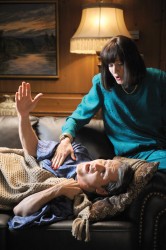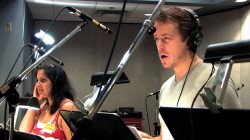 When the Globe and Mail first broke the story last October that there was going to be an opera film about Brian Mulroney, an astonishing 58 readers wrote comments on the website, and all of them were pure vitriol. Clearly, Mulroney, Canada’s 18th prime minister, may well be the most hated politician in modern Canadian history.
When the Globe and Mail first broke the story last October that there was going to be an opera film about Brian Mulroney, an astonishing 58 readers wrote comments on the website, and all of them were pure vitriol. Clearly, Mulroney, Canada’s 18th prime minister, may well be the most hated politician in modern Canadian history.
Well, Mulroney haters (among whom I include myself) can take heart. When I watched the screener, I started to laugh from the very first frame, and was still chortling after the fade-out. In truth, Mulroney: The Opera is absolutely delicious political satire, with every character of every political stripe coming in for a drubbing. On a more serious note, opera lovers will appreciate composer Alexina Louie’s clever pastiche score and librettist Dan Redican’s hilarious rhyming couplets. Louie is one of Canada’s most important composers of new music, while Redican is a revered comedian.
In a real coup, the 75-minute Mulroney: The Opera will be shown in Empire movie theatres across Canada as a special presentation of the Metropolitan Opera’s wildly popular “Live in HD” series. The program also includes the 26-minute Behind the Curtain: The Making of Mulroney: The Opera. The first screening takes place Saturday, April 16 at 1pm, with a repeat on Wednesday, April 27 at 7pm. Peter Gelb, the Met’s general manager, even gives the tongue-in-cheek introduction from the opera company’s broadcast truck.
Mulroney: The Opera represents a unique genre – original opera for the camera. The three creative geniuses behind the project – Louie, Redican and director Larry Weinstein – first came together with the short film Toothpaste (2001). Louie and Redican had written Toothpaste when they were thrown together at a Tapestry New Opera LibLab where composers and librettists create five minute operas in 24 hours. Weinstein, a co-founder of Rhombus Media, filmed the short, which features a couple warring over the cap left off the tube. The success of Toothpaste led to Burnt Toast (2005), in which Toothpaste became one of eight mini-operas about romantic relationships. Both films have been big sellers for Rhombus at home and abroad.
Which brings us to Mulroney: The Opera. The project began in 2006 as cultural programming for the CBC. Says Weinstein: “In thinking about what would make a good subject, we settled on political humour which is a real Canadian strength. We chose Mulroney because he’s an archetype of the slick politician who desires greatness but who has tragic flaws that ultimately bring him down. He’s a real paradox – the guy who won the largest majority in Canadian history, but who is now universally reviled. We actually toyed with changing his name to Myron Baloney to add to the satire, but happily, we dropped that idea.”
When the CBC went through one of its periodic bouts of cultural suicide, the project was dropped, which meant the loss of CBC funding. Says producer Jessica Daniel: “Rhombus can usually tap into foreign money because of its international reputation for quality. But because Mulroney: The Opera was so specifically Canadian, it had to be financed 100% in country.” The $3.75 million budget comes from Telefilm Canada, Canada Media Fund and various provincial and federal tax credits – so, yes indeed, Canadian tax payers have financed Mulroney: The Opera.
When Weinstein approached his old cohorts about the project, Louie was somewhat intrigued, but Redican was definitely not. “I remember thinking this isn’t for me,” he says. “All I do is comedy, and Mulroney needs something dramatic. I kept quitting, but Larry wouldn’t let me.” Finally, Redican came up with the only idea that would work for him – a series of scenes, each one being a political cartoon, each with a different voice or mood. “The film is an episodic biography,” he explains. “It’s an arc of a life. Rather than following a linear story, the libretto follows a character.”
The film begins with a reluctant Jean Chrétien unveiling Mulroney’s official portrait in the House of Commons in 2002. (Trivia note: Colin Mochrie, who plays Chrétien, slants his jaw the wrong way; Weinstein toyed with the idea of using a reverse print to set it right.) The scenes that follow are flashbacks. We see Little Brian in his birth place, Baie Comeau, the meeting at the country club with Mila Pivnicki who would become his wife, his high-jacking the Conservative party, and the various scandals that dogged his government, with a passing nod to Karlheinz Schreiber. The television debate with John Turner and Ed Broadbent is an absolute hoot, not to mention the patronage chorale, Mulroney’s habanera duet with Pierre Trudeau post Meech Lake, and the Shamrock Summit with Ronald and Nancy Reagan.
And then there are Redican’s breathless rhymes.
“I’ll take my place in history!
Come forward, one and all, to honour me!!
There’s none as great as me …” and
“I have the chin! I’m not afraid!
I have the chin, I’m going to win!”
According to Redican, Mulroney’s own words comprise much of the libretto. “He’s always been the hero of his own story,” explains Redican, “which made it easier to write the libretto from his point of view.” Redican goes on to describe Mulroney as a very bright but driven man who passionately believed in his own sense of destiny, yet whose self-aggrandisement concealed a huge sense of insecurity. He also points to a more positive side – that Mulroney was a rough and tough, hard-drinking man who cleaned up his act to become a loving husband and father. Redican, who calls himself a knee-jerk liberal, even grew to like Mulroney during the months that he lived with him, so to speak. As for his portrayal of Mulroney in the libretto, he adds: “I can’t imagine that he’ll be having me over for dinner any time soon.”
For Louie, composing Mulroney: The Opera meant finding the right style of music to accompany each scene. Her score includes bump and grind, Gilbert & Sullivan, music theatre, Broadway razzmatazz, blues, sports-specific fanfare, folksong, jazz, tango, choral, rock and grand opera, to mention but a few. The music took over five years to compose and seven months to orchestrate. Opera devotees will delight in quotes from Bizet, Wagner and Mozart, which turn up in the most surprising places. “I think I wrote incredibly accessible music,” says Louie. “This was never a new music project.” She also points out that music for opera on film must clip along faster than on the stage. “There isn’t time for stopping and just singing,” she says. “Plot has to be happening all the time. Larry kept wielding the whip.”
According to Louie, the creative process included getting scenes from Redican, then composing the music, taking her cue from Redican’s words. Redican and Weinstein would then come over to Louie’s house where she would play the piano and sing all the parts (in what she admits is not the greatest of voices). Serious discussions would follow about what to keep, what to replace, and such like, in what was a very collaborative effort. In the end, Louie had to come up with two completely different scores – the piano (for the singers) and the orchestral.
“When I look back,” she says, “it was a lot of work, but I’m proud of the fact that it’s not cheap music. There are very beautiful and charming moments amid the laughter. I really like the character music I wrote for Mulroney. That’s the paradox of opera – the creeps get to sing the best parts. It was such a labour of love that I have kept every page of music from every rewrite. It was so hard to let the project go that I showed up at the actual shoot where I wasn’t really needed. I felt very gratified when I heard the crew singing different snatches of the score.”
Mulroney: The Opera required two completely different casts – the singers and the actors – and a veritable who’s who of Canadian talent was gathered together for this project. First came the pre-recording with the singers, and then the shoot with the actors. Conductor Alex Pauk and his 23-member Esprit Orchestra provided the music. Stratford veteran director Donna Feore did the choreography and musical staging.
Weinstein believes in location filming, and there were 19 different locations during the 19 days of shooting. For example, Pioneer Village stood in for Baie Comeau, the country club was a pool at a private home, and Knox College and Casa Loma represented Parliament (although there was some secret filming done at the actual Parliament buildings with a high definition camera).
The director had scouted a place in Holt Renfrew to film the Mila shopping scene, but in order not to give away the true satirical nature of Mulroney: The Opera, the store had been given a vague scenario. Weinstein had to beat a hasty retreat when Holt Renfrew offered to put him in touch with Mrs. Mulroney’s personal in-store stylist. In order to keep the lowest possible profile, the shopping scene was filmed on a specially created studio set.
Louie describes the arduous process of finding the right opera singer for Mulroney. “He had to act with his singing,” she explains, “and have a deep sound to mirror Mulroney’s speaking voice. We must have listened to hundreds of demo tapes.” In the end, they settled for gifted bass-baritone Daniel Okulitch who was suggested by David Cronenberg. Cronenberg had directed Okulitch in The Fly, an opera by Howard Shore that premiered in Paris in 2008.
Says Okulitch: “I like taking on unique projects, but this was a real challenge because I was making choices for the actor by the way I sang. Larry would describe what was going on in the scene, and then direct us during the rehearsals by saying try being more sarcastic here, or less self-pitying there, for example. When I’m performing in an opera, physicality informs how I sing, but with this role, I didn’t know specifics about the staging. My job was to make Mulroney’s intentions and motivation very clear. I was most concerned with characterization and interpretation.”
Because Okulitch keenly felt his responsibility to the actor who would be using his voice, he did extensive research, such as reading Peter C. Newman’s The Secret Mulroney Tapes: Unguarded Confessions of a Prime Minister. After all, Okulitch was just a child when Mulroney was in power, and reading about him was an education in itself. As for Louie’s musical pastiche, Okulitch drew on his experience in musical theatre and jazz. Says Okulitch: “In the end, I had a lot of fun. The opera is satirical, irreverent and slightly absurdist. It’s a musical comedy written for operatic voices.”
Finding the actor to play Mulroney on screen was even harder. In the opera, Mulroney is a larger than life figure, and it would take a giant amount of charisma to fill his shoes. Mulroney’s part also covers half the words of the libretto, and he is in almost every scene. Weinstein’s process was first to interview actors in an informal meeting before the actual audition, which included lip sync ability.
 Like Mulroney, actor Rick Miller is from Quebec and felt a kinship with this other native son. Mulroney’s character, warts and all, also appealed to him. He really wanted the role, but when the auditions were being conducted, Miller would be in California touring his one-man show MacHomer (where he plays all the characters in Macbeth with voices from the hit TV show The Simpsons). Miller needed a B Plan, and he came up with an ingenious way for Weinstein to really see his acting chops.
Like Mulroney, actor Rick Miller is from Quebec and felt a kinship with this other native son. Mulroney’s character, warts and all, also appealed to him. He really wanted the role, but when the auditions were being conducted, Miller would be in California touring his one-man show MacHomer (where he plays all the characters in Macbeth with voices from the hit TV show The Simpsons). Miller needed a B Plan, and he came up with an ingenious way for Weinstein to really see his acting chops.
First, he borrowed the recorded tracks. He then went to Goodwill where he bought a cheap blue suit and red tie. With baby powder in his hair to age him, he was ready. Explains Miller: “I was going to show Larry that I was right for the part. On my own videocam, I recorded five scenes, lip syncing to Daniel’s voice. I made sure to show off my ability to capture different moods.” He got the role, even though it meant spending almost three hours a day getting Mulroney’s famous lantern jaw attached to his face. “I spent a month living under his chin,” quips Miller.
The actor had a very definite approach to Mulroney. “I wanted to humanize him, so I felt it was my duty to read both his tedious autobiography and the much more interesting Secret Tapes. Yes, he was an Irish brawler who achieved greatness – the golden boy who really believed that he did a good job, and then had a giant fall. But there is more to him than caricature.”
And then there is Mila. Soprano Zorana Sadiq sang the role, while actor Stephanie Anne Mills portrayed her on screen. Says Sadiq: “In my research, I wanted to get a sense of her speaking voice to help with my singing interpretation, but I couldn’t find one clip of her talking. She was always mute beside her husband. There was no sense of the personal Mila, so I had to make her up.” Mills relied on her mother to help her with the role. “She told me about Mila’s shopping and self-indulgence,” says Mills. “Although Mila did stay out of the public eye, she was a very supportive wife to Brian. I saw the Mulroneys through a woman’s eye. He was a man trying to do the right thing, and Mila was his backbone.”
Weinstein, who prides himself on accuracy, does admit that Mila was not sporting her famous bangs when she first met Mulroney. In the film she has bangs throughout. And here’s another Mila tidbit: A natural broadcast outlet for Mulroney: The Opera would be The Movie Network and Home Box Office Canada. Unfortunately, Mila Mulroney sits on the board of Astral Media, which owns the two television stations. Apparently, a big money maker for both Mulroneys is sitting on as many boards as they can. That seems to be their current occupation.
A very interesting fact about Mulroney: The Opera concerns the confidentiality agreement that every member of the cast and crew had to sign. In fact, for almost five years, Mulroney: The Opera was the best kept secret in town. The working title was Politics Are Cruel, and characters were referred to by their initials, like B.M. for Mulroney. The reason for the secrecy was the fact that Mulroney is notoriously litigious, and Weinstein did not want any injunctions or other barriers to impede the progress. Out of courtesy, however, and after the film was in the can, Rhombus did send a letter to both Mulroney and his TV host son, Ben, informing them about the film. They have not, to this point in time, received a reply. n
The world premiere of Mulroney: The Opera takes place Saturday April 16 at 1pm, with a repeat on Wednesday April 27 at 7pm.
Visit www.empiretheatres.com for ticket information and theatre locations.
If you enjoyed this article about Mulroney: The Opera you may enjoy the articles Sync or Swim and Battle of the Booths also written by Paula Citron.



